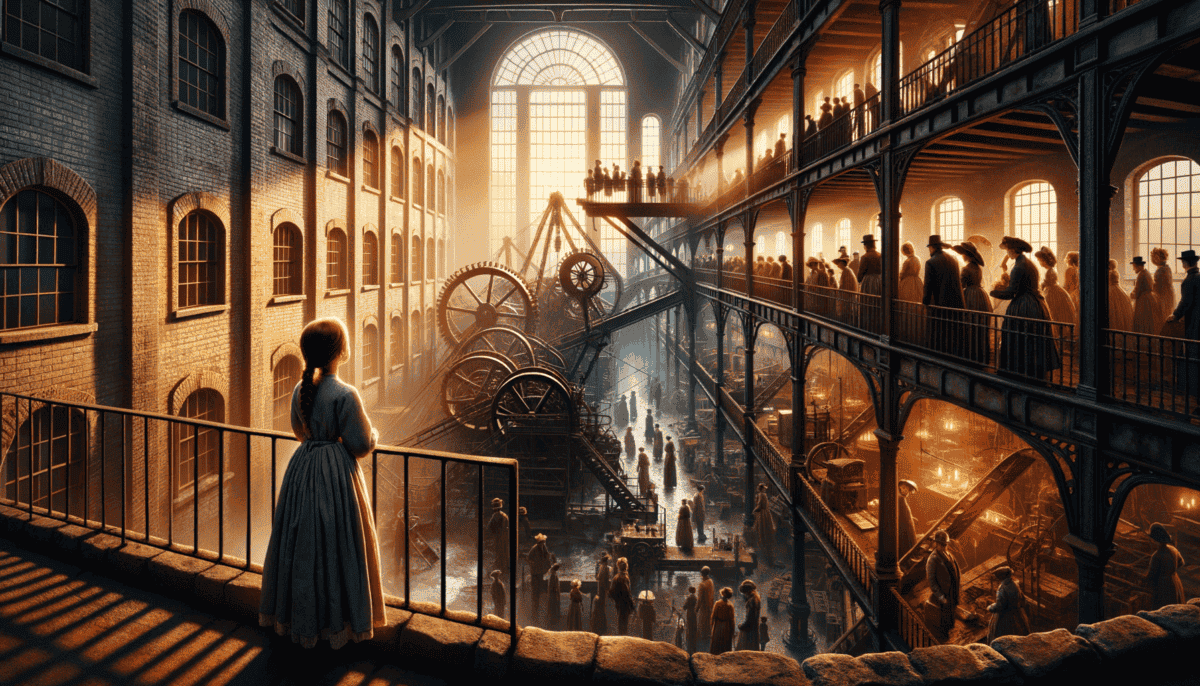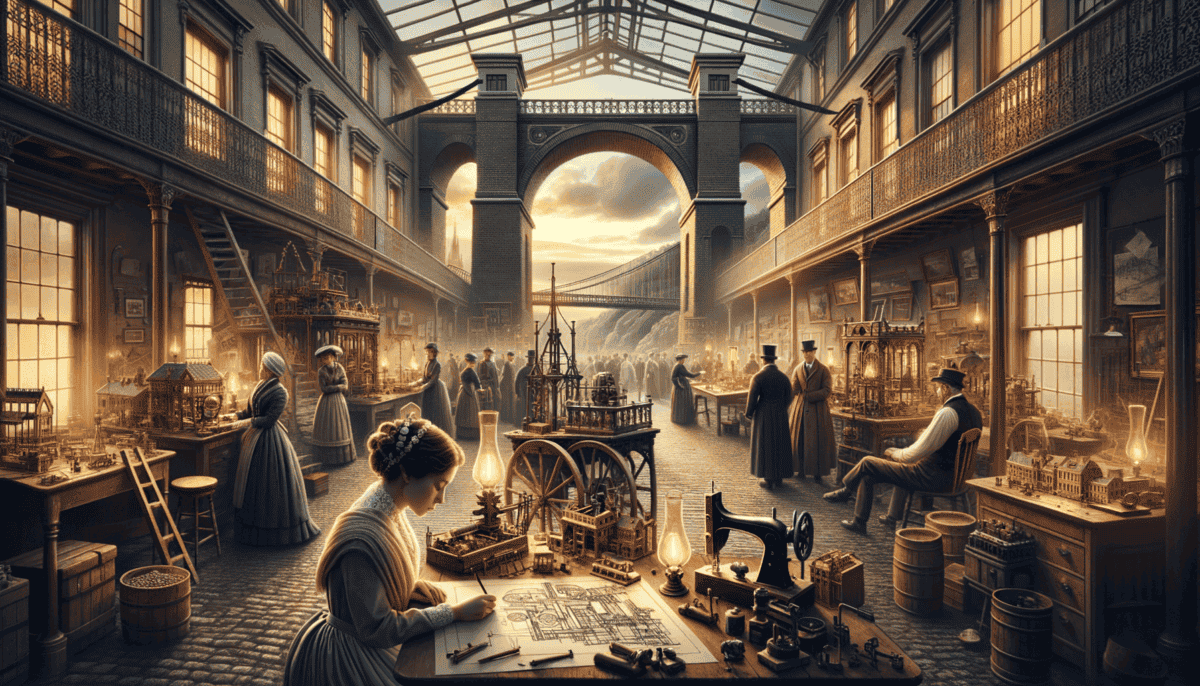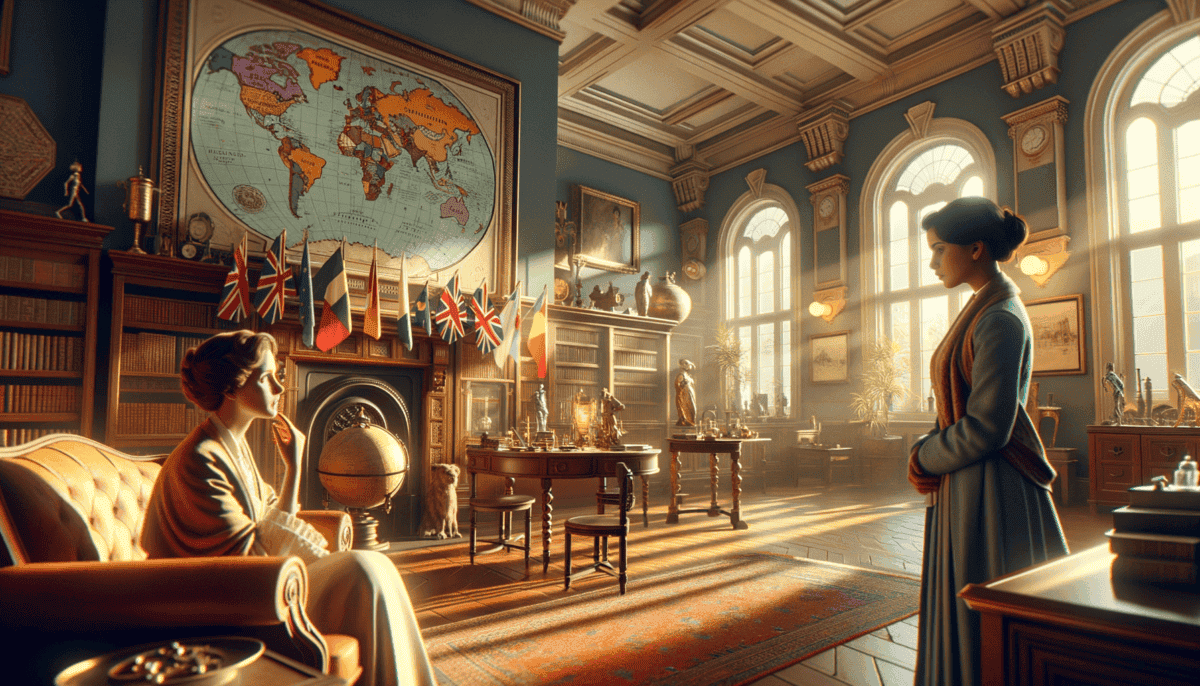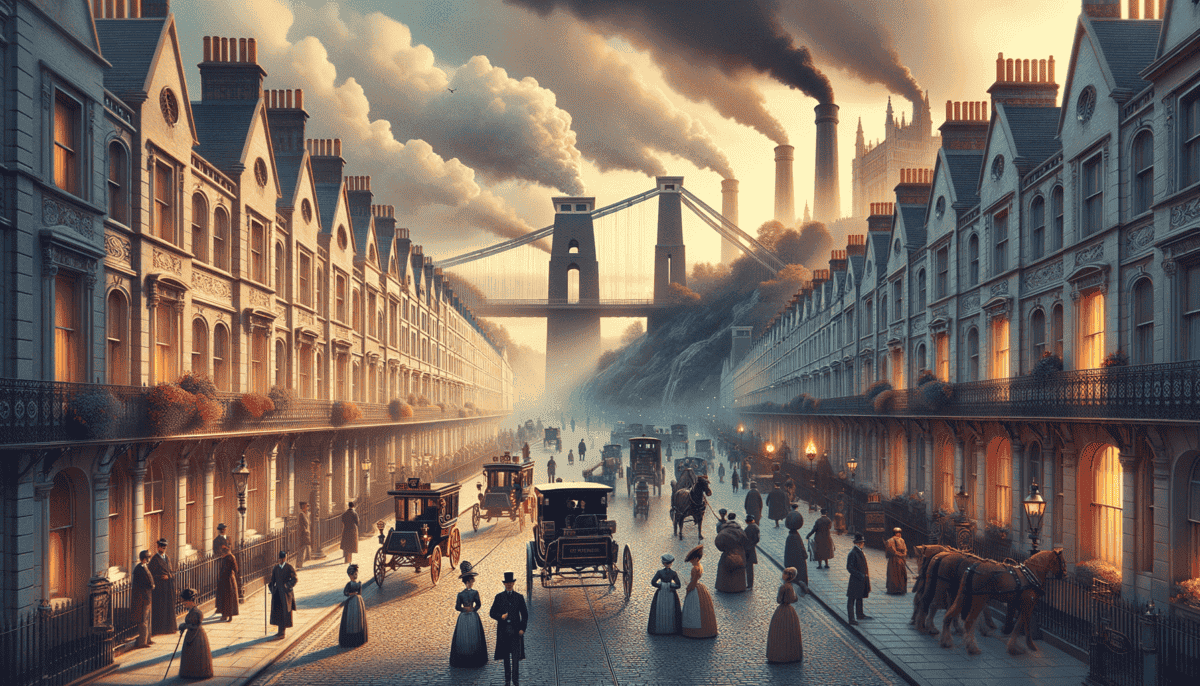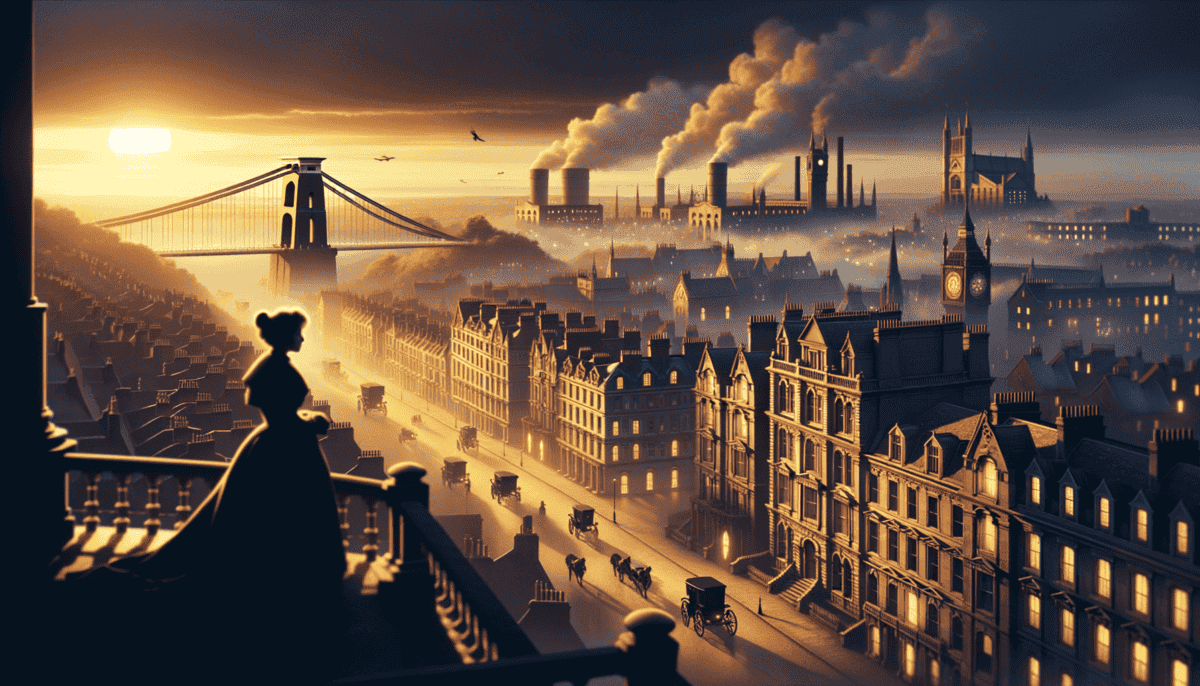The Awakening of an Empire
The morning sun painted London's rooftops gold as twelve-year-old Elizabeth Pembroke pressed her nose against the cold window glass. Below, the cobblestone streets buzzed with excitement. People rushed about, their voices carrying up to her third-floor bedroom.
"Elizabeth! Come down for breakfast!" her mother called from below.
Elizabeth smoothed her dark blue dress and hurried downstairs. The smell of fresh bread and tea filled their cozy home. Her father sat at the table, his newspaper spread wide.
"Papa, why is everyone so excited today?" Elizabeth asked, sliding into her chair.
Mr. Pembroke lowered his paper, his eyes twinkling. "Today is a very special day, my dear. Our new Queen Victoria is being crowned!"
"Can we go watch, Papa? Please?" Elizabeth bounced in her seat, making her dark curls dance.
Mrs. Pembroke placed a steaming cup of tea before her daughter. "The streets will be very crowded, dear."
"But Mama, this is history!" Elizabeth pleaded. "And I promise to stay close to Papa."
Her parents exchanged knowing looks. Mr. Pembroke worked as a clerk at a new factory that made steam engines. He understood his daughter's curiosity about the changing world around them.
"Very well," he agreed. "But first, you must finish your breakfast."
Elizabeth had never seen London's streets so alive. People from all walks of life filled the sidewalks. Ladies in fine dresses walked alongside workers in plain clothes. The air hummed with the sound of horses' hooves and carriage wheels on cobblestones.
"Look there!" Mr. Pembroke pointed to a gleaming new steam locomotive puffing past. "That's progress, Elizabeth. The world is changing fast."
Elizabeth watched in wonder as the metal beast rolled by. "Will I get to ride on one someday?"
"I believe you'll do more than just ride them, my dear. You might help build them!" Her father squeezed her hand.
As they neared Westminster Abbey, the crowd grew thicker. Elizabeth stood on her tiptoes, trying to see over the sea of top hats and bonnets. Suddenly, a great cheer went up.
"The Queen! The Queen!" voices called out.
Through gaps in the crowd, Elizabeth caught glimpses of a golden carriage. Inside sat a young woman wearing a crown that sparkled in the sunlight. Queen Victoria looked so small, yet she held herself like a giant.
"Papa," Elizabeth whispered, "do you think I could do important things too? Like the Queen?"
Mr. Pembroke lifted Elizabeth onto his shoulders. "My dear girl, you're growing up in an age of wonders. The world is changing, and you can be part of that change."
On their walk home, Elizabeth noticed things she'd never paid attention to before. The new gas streetlamps being installed. The factory chimneys puffing smoke into the sky. The mix of horse-drawn carriages and early automobiles sharing the roads.
That evening, Elizabeth sat at her desk and wrote in her diary:
Dear Diary,
Today I saw a queen and a steam engine. Mama says I’m too curious for my own good, but Papa says curiosity is good. The world is changing so fast. I want to be part of it all. I want to make things better, like Queen Victoria. I don’t know how yet, but I’ll find a way.
As she got ready for bed, Elizabeth could still hear the excitement from the streets below. New sounds mixed with old – the clip-clop of horses, the whistle of steam engines, the calls of street vendors. London was awakening to a new age, and so was Elizabeth Pembroke.
Through her window, she watched the lamplighter making his rounds, bringing light to the darkening streets. Tomorrow would bring new adventures, new questions, and new chances to be part of this changing world.
Factories and Futures
Elizabeth’s feet carried her down the narrow London street, her heart pounding with each step. Papa had finally agreed to let her visit his workplace – the Thompson & Sons Steam Engine Factory.
“Stay close to me,” Mr. Pembroke warned as they approached the towering brick building. Black smoke billowed from its tall chimneys into the gray morning sky.
The factory doors creaked open, and a wave of heat hit Elizabeth’s face. The noise was overwhelming – clanking metal, hissing steam, and the constant thrum of machinery.
“Good morning, Mr. Pembroke!” A tall man with kind eyes approached them. “And who might this young lady be?”
“Thomas, meet my daughter Elizabeth. Elizabeth, this is Thomas Wright, our foreman.”
“Welcome to our world of steam and steel, Miss Elizabeth,” Thomas smiled warmly. “Would you like a tour?”
As they walked through the factory, Elizabeth’s eyes widened at the sight of workers much younger than herself. Small children darted between massive machines, their faces streaked with soot.
“Why are there so many children here?” Elizabeth whispered to Thomas.
Thomas’s smile faded. “Their families need the money, miss. Times are hard for many folks.”
“But they’re so young,” Elizabeth protested. “And it looks dangerous.”
A small girl no more than eight years old scurried past, carrying a heavy bucket of coal. Elizabeth watched as she disappeared into the shadows between the machines.
During lunch break, Elizabeth sat with some of the young workers. A girl named Mary shared her meager bread with Elizabeth.
“Don’t you go to school?” Elizabeth asked Mary.
“School?” Mary laughed softly. “That’s for rich folk. We work to eat.”
Thomas appeared beside them. “Things are changing, though. Some people are fighting to make things better for child workers.”
“How?” Elizabeth leaned forward, eager to learn more.
“There’s talk of new laws,” Thomas explained. “Laws to make sure children get some schooling and don’t work such long hours.”
That evening, Elizabeth couldn’t stop thinking about Mary and the other children. At dinner, she barely touched her food.
“What’s troubling you, dear?” Mrs. Pembroke asked.
“Mama, why do some children have to work in factories while I get to go to school?”
Her parents exchanged glances.
“The world isn’t always fair,” Mr. Pembroke said gently. “But people are working to make it better.”
“I want to help,” Elizabeth declared. “Could we start by teaching Mary to read?”
Thomas had told her that some workers stayed late in the factory yard. With her parents’ permission, Elizabeth began visiting after work hours, bringing books and teaching materials.
Mary proved to be a quick learner. Soon, other child workers joined their little group. Thomas helped by providing a safe space in the factory yard and extra candles for light.
“Reading opens new worlds,” Elizabeth told her students. “It gives us power to change things.”
One evening, as Elizabeth packed up her books, Thomas approached her.
“You’re doing a fine thing here, Miss Elizabeth. These children need hope as much as they need learning.”
“I wish I could do more,” Elizabeth sighed, watching Mary practice writing letters in the dirt.
“You’re young yet,” Thomas smiled. “But you’re already making a difference. Sometimes the smallest changes lead to the biggest improvements.”
As Elizabeth walked home with her father that evening, she noticed new posters on the walls calling for factory reforms. The world was changing, but not fast enough for the children she’d met.
In her diary that night, she wrote:
Dear Diary,
Today I saw how hard some children have to work. It’s not fair. But Thomas says things are changing. I’m going to help make them change faster. Every child should have a chance to learn and play. Maybe when I grow up, I can help make new laws to protect children. For now, I’ll keep teaching Mary and the others. Small changes can grow into big ones.
As she closed her diary, Elizabeth heard the distant whistle of the factory’s evening shift ending. Tomorrow would bring another day of teaching, learning, and working toward a better future for all children of Victorian London.
Dreams and Steam
Elizabeth sat at her desk, sketching furiously in her notebook. The morning sun streamed through her window, illuminating the drawings of gears and levers that filled the pages.
“What are you working on, dear?” her mother asked, peering over her shoulder.
“It’s a machine to help the factory children, Mama! Look – it could lift heavy loads so they wouldn’t have to!”
A knock at the door interrupted them. It was Thomas, the kind factory foreman, holding something wrapped in cloth.
“Good morning, Miss Elizabeth! I brought something that might interest you,” he smiled, unveiling a small model steam engine.
Elizabeth’s eyes sparkled. “It’s beautiful! How does it work?”
Thomas set the model on the table. “Watch closely.” He added water and lit a tiny flame beneath it. Soon, the miniature wheel began to turn.
“Steam power is changing our world,” Thomas explained. “Just like your mind is full of steam – always working, always creating!”
Later that day, Elizabeth visited the Great Exhibition at Hyde Park. The enormous Crystal Palace gleamed like a giant jewel made of glass and iron.
“Look at all the inventions!” she gasped, spinning around to take in the sights.
She met an inventor named Mr. Harrison, who showed her his latest creation – a machine that could sew faster than human hands.
“But won’t that take jobs away from seamstresses?” Elizabeth asked, thinking of Mary’s older sister who worked as a seamstress.
“Change can be scary,” Mr. Harrison nodded. “But these machines can make things better too. Clothes will become cheaper, so more people can afford them.”
Elizabeth pulled out her notebook and showed him her drawings. “I want to make machines that help people too.”
“A girl inventor?” A boy nearby laughed. “That’s not proper!”
Elizabeth felt her cheeks burn, but Mr. Harrison spoke up firmly.
“Some of the best ideas come from seeing things differently. Never let anyone dim your spark, young lady.”
That evening, Elizabeth worked on her invention in the garden shed. Her father had given her permission to use his tools, though her mother worried it wasn’t “ladylike.”
Mary came to help, her hands still dirty from the factory. Together, they built a small prototype of Elizabeth’s lifting machine using wooden spools and string.
“It works!” Mary cheered as they successfully lifted a heavy brick. “We did it!”
Thomas visited again the next day, bringing more technical books for Elizabeth to study. He found her and Mary in the shed, surrounded by gears and springs.
“Your lifting machine is clever,” he said, examining their work. “But have you thought about using steam power?”
Elizabeth’s face lit up. “Could you help us?”
Over the next few weeks, Elizabeth, Mary, and Thomas worked together to improve the design. Other factory children started visiting too, offering ideas from their experience.
One day, Elizabeth’s mother found her covered in grease, tinkering with gears.
“Elizabeth, dear, shouldn’t you be practicing your needlework?”
“Mama, I can do both. The world is changing – girls can be inventors too!”
Mrs. Pembroke sighed, but there was a hint of pride in her smile.
That night, Elizabeth wrote in her diary:
Dear Diary,
Today we made our machine better! Thomas says we might even show it at next year’s exhibition. Some people think girls shouldn’t invent things, but I won’t let that stop me. The world needs new ideas from everyone – boys and girls. Maybe my inventions can help make work easier for children like Mary. Dreams and steam can change the world!
As she fell asleep, Elizabeth’s mind whirred with new ideas, like the gears of a great machine turning toward tomorrow.
Distant Shores and Hidden Truths
Elizabeth stared at the strange spices and colorful fabrics spread across her father’s desk. The scents of cinnamon and cardamom filled the air.
“Where did all this come from, Papa?” she asked, running her fingers over a piece of silk.
“From India, my dear. Our empire stretches far across the seas now.”
A soft knock interrupted them. Their new housemaid, Priya, entered carrying tea. She had come from India just months ago.
“These spices,” Priya said quietly, “they grow in my village.”
Elizabeth saw something sad in Priya’s eyes. “What was your home like?”
“It was beautiful – full of colors and life. But many things have changed since the Company came.”
Later that day, Elizabeth visited the docks with her father. Big ships loaded with tea, cotton, and spices filled the harbor.
“Look how wealthy our empire has become!” a merchant boasted nearby.
But Elizabeth remembered Priya’s sad eyes. “Papa, do the people in India want to send us their things?”
Her father looked uncomfortable. “It’s… complicated, my dear.”
That evening, she found Priya in the kitchen, teaching Mary how to make chai tea.
“Could you tell us more about India?” Elizabeth asked.
Priya smiled and began sharing stories of festivals, ancient temples, and skilled craftspeople. But her voice grew softer when she spoke of recent changes.
“Our weavers once made the finest cloth in the world. Now the machines make everything.”
Elizabeth thought of her own love for machines and felt confused. “Aren’t machines supposed to make things better?”
“Progress should lift everyone up,” Priya said wisely, “not just some while others fall.”
The next day, Elizabeth visited the British Museum with her class. She saw beautiful objects from around the empire displayed in glass cases.
A carved jade elephant caught her eye. The label said: “Collected from the Royal Palace of Delhi.”
“You mean taken,” whispered a boy named Raj, standing nearby. His father was a scholar from India.
That night, Elizabeth couldn’t sleep. She thought about Priya’s village, the busy docks, and the museum’s treasures. The world seemed bigger and more complex than she had imagined.
She decided to learn more. Raj helped her find books about India’s history. Priya taught her to write some words in Hindi.
Elizabeth started a special project. She drew pictures of all the connections between London and other places. Lines crisscrossed her map like a giant spider web.
“We’re all connected,” she told Mary, “but not always in fair ways.”
One day, Elizabeth’s father found her mapping project.
“You’re asking big questions,” he said, looking thoughtful.
“I want to understand, Papa. If we’re part of this system, don’t we have a duty to make it better?”
He hugged her tightly. “Perhaps that’s the most important question of all.”
Elizabeth organized a special tea party. Priya made Indian sweets, Raj brought his mother’s curry, and Mary helped serve. People shared stories and learned from each other.
Dear Diary,
Today I learned that progress isn’t simple. What helps some people might hurt others. But maybe understanding each other is the first step to making things right. Priya says knowledge is like a lamp – it helps us see better in the dark.
As Elizabeth closed her diary, she looked out her window at the busy London streets. The empire’s reach was long, but so was the power of understanding and kindness.
The Rise of Hope
The morning sun streamed through the window as Elizabeth pinned newspaper clippings to her wall. Stories about workers’ rights, education reform, and women’s suffrage filled the space.
“What’s all this about?” Mary asked, bringing in fresh linens.
“I’m tracking the changes people want to make,” Elizabeth replied excitedly. “Look at this!”
She pointed to an article about Florence Nightingale, who was making hospitals better for sick people.
“One person really can make things better,” Elizabeth said. “Miss Nightingale proved it!”
That afternoon, Elizabeth visited Thomas at the factory. Children younger than her still worked there, but things were starting to change.
“We’ve cut work hours for the little ones,” Thomas said proudly. “And we’re starting a school room!”
Elizabeth helped set up the small classroom. She brought books, slates, and chalk.
“Will you teach us?” asked Sarah, a small girl with bright eyes.
“I’d love to!” Elizabeth smiled. “Everyone deserves a chance to learn.”
At home, Priya was teaching cooking classes to neighborhood women. The kitchen filled with wonderful smells and happy chatter.
“Food brings people together,” Priya said, showing them how to make chapati bread. “And when we’re together, we’re stronger.”
Elizabeth’s father watched all this with pride. “You’ve started quite a movement in our house,” he said.
“Changes start small, Papa. Like ripples in a pond.”
One rainy day, Elizabeth organized a meeting. Factory workers, housemaids, and even some fancy ladies came. They talked about making things better for everyone.
“We need more schools,” said Thomas.
“And safer working places,” added Mrs. Thompson, a seamstress.
“Don’t forget about voting rights for women!” called out Elizabeth’s mother, surprising everyone.
Elizabeth wrote everything down in her notebook. She was learning that change needed many voices and helping hands.
The next week, she visited a new hospital where nurses trained the Florence Nightingale way. Everything was clean and organized.
“Would you like to help roll bandages?” asked a kind nurse.
While working, Elizabeth heard stories about how things used to be, and how much better they were getting.
Back at the factory school, more children came each day. Elizabeth taught them reading and numbers, but also about the changing world.
“Miss Elizabeth,” little Tom asked, “can I be anything I want when I grow up?”
She smiled. “The world is changing, Tom. More doors are opening every day.”
Dear Diary,
Today I saw hope in so many eyes. Workers learning to read, women speaking up, people helping each other. Maybe that’s what progress really means – everyone rising together.
Elizabeth stood at her window that evening, watching lamplighters brighten the darkening streets. Each light seemed to represent a small change, making the whole city brighter. ✨
Her wall of newspaper clippings had grown. But now it showed more than just problems – it showed solutions and hope.
“Ready for tomorrow’s meeting?” Mary asked, bringing in Elizabeth’s evening tea.
“Yes,” Elizabeth smiled. “There’s so much more to do, but we’re not doing it alone anymore.”
The evening bells rang across London, their sound carrying promise on the wind. Change was coming, one small step at a time.
A New Dawn
One year had passed, and Elizabeth sat in her father’s study, looking at her old diary. She was now thirteen, and London had changed so much!
“Elizabeth!” called Priya from the doorway. “The children are waiting for their lesson.”
At the factory school, bright faces greeted her. The room looked different now – clean walls with colorful pictures, neat rows of desks, and big windows letting in sunshine. ☀️
“Miss Elizabeth, I can read whole books now!” Sarah exclaimed, holding up her favorite story.
Thomas appeared at the door, smiling. “And not just reading. Tell her about your invention, Sarah.”
Sarah proudly showed Elizabeth a small machine she’d made. It helped count thread spools faster in the factory.
“Just like you taught us,” Sarah beamed. “We can make things better!”
Back home, Elizabeth found her mother hosting a meeting. Women from all parts of London sat together, planning ways to help more girls go to school.
“Your daughter inspired us,” Mrs. Thompson told Elizabeth’s mother. “Now my own girls dream bigger.”
Priya had started a special cooking school where women learned to make food from around the world. The kitchen always smelled wonderful!
“Food teaches us about each other,” Priya said, stirring a pot of curry. “And understanding brings us closer.”
“We’re all part of one big family now,” Elizabeth’s father said, tasting the curry. “A family that helps each other grow.”
The newspaper wall in Elizabeth’s room had changed too. Now it showed good news – new schools opening, better laws for workers, and women doing amazing things.
One special evening, Elizabeth walked with Thomas through the factory. The machines were quiet, but hope echoed in the halls.
“Remember when you first came here?” Thomas asked. “You wanted to change everything.”
“And look what happened,” Elizabeth smiled. “We all changed things together.”
That night, Elizabeth wrote in her diary:
Dear Diary,
London feels different now. Not just the big things, like new schools and better jobs. It’s the way people look at each other – with kindness and hope. We learned that everyone has something special to give. When we work together, amazing things happen!
The next morning, Elizabeth watched the sun rise over London. Factory chimneys still puffed smoke, but between them, she could see new schools, hospitals, and places where people helped each other.
“What’s next?” Mary asked, joining her at the window.
“Everything!” Elizabeth laughed. “We’re just getting started.”
As if agreeing, Big Ben chimed in the distance. Its strong, clear bells rang out over a city that was changing, growing, and learning to dream bigger every day. Elizabeth smiled, knowing that the best changes happened one kind heart at a time. ✨
The Victorian Era was changing England, but people like Elizabeth, Thomas, Priya, and all their friends were changing it for the better. They showed that when people care and work together, they can make the world a brighter place for everyone.
And somewhere in London, a young girl picked up a book in her new school, dreaming of the wonderful things she would do next. The story wasn’t ending – it was just beginning.


